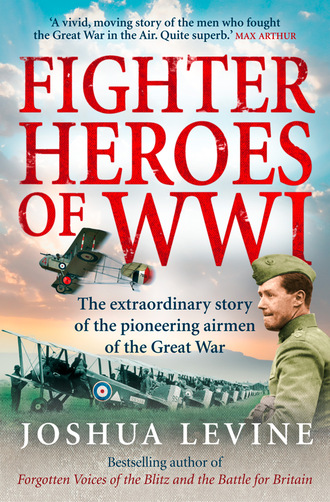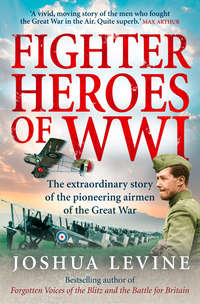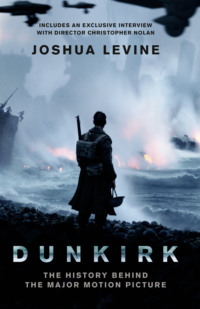
Полная версия
Fighter Heroes of WWI
The Great War was a time of intense patriotism in the British colonies. Frank Burslem was born and raised in Trinidad, but he considered himself as British as any man born in the British Isles:
I thought that any enemy of England was an enemy of mine and I wanted to be in the war. When I was sixteen years old in 1917, I was six foot two tall, and I knew that there was a ship going from Trinidad to England with eight vacant berths. Local merchants paid for the berths and sent eight young fellows who wanted to join the army over to England. My father allowed me to go, but when he gave me my birth certificate, he told me I was to do some kind of war work like munitions or working the land. But when I got to England, I never showed my birth certificate to anybody. I told them that I was three years older than I really was, and I joined the army. I had no difficulty going against my father’s wishes – I was a patriotic youth and I wanted to be in it.
When we arrived in England, the eight of us went to New Scotland Yard, where we saw a fatherly sergeant and told him we wanted to join the army – and he put us in. Being volunteers, we had a choice of what service or regiment to go for. As the other fellows were going into the Artists Rifles, that’s what I chose too.
I went to the basic training camp at Gidea Park, but I didn’t like it very much. The marching was so strenuous and I found it numbed and cramped the muscles in my thighs and calves. I stood it for a week, but after that I reported ill, and went before the doctor. He expected somebody ‘swinging the lead’. He asked what the matter was, and I said, ‘Anchhylostomiasis, sir.’ ‘Good God, what’s that?’ he asked. It was hookworm. I told him that just before leaving Trinidad, the Rockefeller Foundation had tested me and discovered that I had hookworm. I knew that I still had it. It meant that I wasn’t strong enough to do the strenuous work in the infantry. So they sent me to hospital and gave me the remedy. After that I was cured, and I went back to the regiment, where I could stand the drill. But by now, I’d seen what life in the infantry was like, and I thought it would be better for me if I didn’t do that kind of work. As they didn’t form fours, or anything like that, I changed my papers for a commission in the RFC.
Stanley Walters had problems reaching Britain from Rhodesia:
I did my damnedest to join the Royal Flying Corps, but I hadn’t got any money to get to England. Eventually, I persuaded somebody to let me go in and see the manager of the Union Castle Company. He asked what I wanted to see him about. I said, ‘I want to join the Royal Flying Corps!’ ‘How praiseworthy,’ he said, ‘how commendable, what have I got to do with that?’ ‘I can’t get to England!’ I said. ‘How disappointed you must be,’ he said. I slid off the chair and went away. Six weeks later, at three o’clock in the afternoon, I got a message. The Land Steffen Castle sails at six o’clock. I could go in her as an assistant purser. He didn’t call my bluff. I made it. I got to England with one golden sovereign so I was compelled to join the Royal Flying Corps immediately on my arrival.
Frederick Powell was stuck in an infantry regiment with no immediate prospect of joining the fight. He knew nothing of flying. He merely saw the Royal Flying Corps as a passport to France:
In November 1914, a circular came round to our battalion asking for volunteers to be an observer for the Royal Flying Corps. I didn’t know what I was volunteering for; my only interest was to get out to France. There was no sense of my wanting to fly, but my regiment seemed to have no chance of getting out to France before Christmas. One point is that, at the time, an observer’s weight had to be ten stone or less, so when I got down to ten stone, I was transferred to the Royal Flying Corps.
They had asked for one officer from each battalion, and there were two of us who wanted to volunteer; a man named Knowles was top of the list, and I was second. They only wanted one, but Knowles told me that he didn’t really want to volunteer because he was engaged to a girl. So if we were asked for one from each battalion, he would stand down. In point of fact, when the moment arrived, he did not stand down; he went. But by great good luck, they asked for another officer from our battalion, so I went too.
Even though I went as an observer, after I had been there two days, I was put down as an orderly officer, which meant that I had to go and report to the adjutant at six o’clock in the evening, and sleep in his office all night, in case the telephone went.
As I reported to the adjutant, the colonel called him into his office. The adjutant went, leaving the door ajar. I didn’t want to eavesdrop but I heard the adjutant say, ‘We’ve got another officer called Knowles, who’s been posted to us.’ The colonel said, ‘Is he an observer or a pilot?’ The adjutant said, ‘An observer.’ The colonel said, ‘Oh, we don’t want any more observers! We’ve got nothing but observers!’ The adjutant said, ‘Well, what shall I do with him?’ The colonel said, ‘Send him back to his regiment!’ And that was the end of Knowles. It frightened me, so that first thing in the morning, I reported to the adjutant and said, ‘Is there any chance, sir, of me being able to learn to fly, to become a pilot?’ I thought he was going to say, ‘Oh no, certainly not!’ but to my astonishment, he said, ‘Really? Do you want to become a pilot?’ ‘Yes sir,’ I said. ‘Oh, good lad! Then start away. We’ll put you down as a pilot!’
Arthur Harris, a man who was to achieve notoriety as commander-in-chief of Bomber Command during the Second World War, used his connections to jump the queue into the oversubscribed Royal Flying Corps:
I went round to the War Office where I was interviewed by a rather supercilious young man. When I said I would like to fly, he said, ‘So would six thousand other people. Would you like to be six thousand and one on the waiting list?’ So I retired rather disgruntled and when I got back, my father had just returned from India. When I told him what had happened, he said, ‘Why didn’t you go and see your Uncle Charlie?’ I had many uncles. I didn’t know who or what or where Uncle Charlie was but my father gave me a note and I went back to the War Office. When I handed the note addressed to Uncle Charlie to the same supercilious young fellow, he said, ‘Oh, please sit down a minute, sir!’ which was rather a change from the day before. He came back about ten minutes later and he said, ‘Colonel Elliot is in conference and unable to see you at the moment but if you will report to Number 2 Reserve Squadron at Brooklands this evening you can start flying.’
Ernest Tomkins, from a humble background, demonstrated that ambition and enthusiasm could defeat social disadvantage:
I asked how I could get into the Flying Corps. I was mad on flying. ‘Not a hope!’ said my brother, ‘You’d have to apply for a commission.’ ‘That’ll do’ I said. ‘Don’t be stupid,’ he said. ‘You haven’t got a certificate of education.’ But he had a word with our CO, who agreed to get in touch with a schoolmaster who’d give me a test. So I took this test – I did some arithmetic and I wrote an essay on a subject I liked. About a month afterwards, I was sent in front of an Air Commodore. I was only eighteen – no age – and he had his staff with him and he said, ‘You’re applying to become an officer. Do you think you’re old enough to become an officer and a gentleman of the British army?’ I said, ‘Yes, sir,’ and I was marched outside. After everyone had been interviewed, the sergeant called out, ‘3659 Private Tomkins’. I took three paces forward and the Air Commodore was very friendly. He said, ‘You’re very interested in flying?’ I said, ‘Yes, sir.’ He had the essay that I’d written in front of him, called ‘The use of aircraft in modern warfare’. He complimented me on it and asked me questions about flying and engines. He said, ‘What makes an aeroplane fly?’ I said, ‘Air has weight. It will resist motion. Flight is secured by driving through the air a plane inclined upwards and forwards of the direction of motion.’ He was surprised and started asking me about combustion engines. Then he asked me questions about my school and family. I knew what I was in for because there were a lot of public schoolboys going in for commissions. So I withdrew while they deliberated. And when I went back, they all agreed that my papers should be forwarded to the War Office.
The Royal Naval Air Service, as befitted the flying branch of the senior service, took a rather high-handed attitude to its entrants. Donald Bremner remembers:
I went up to London once a fortnight to sit on the selection board for candidates for the Royal Naval Air Service. The officer in charge was Commander Samson, known as Sammy. He was a well-known character. He said what he thought to anybody. If you got on well with him – as I did – you got on very well. If you didn’t, you got out. Sammy instituted a procedure where we each had a pencil and paper and all the time we were asking questions of the wretched candidate, we fiddled with our pencils. When we’d asked enough questions, we laid our pencils down. If we were satisfied with him, we held the pencil point upwards. If we wouldn’t have him at any price, we held it point downwards. If there was anyone who was reasonable but we didn’t like him enough, Sammy advised him to try the Royal Flying Corps. Our decision was really based on whether we liked the fellow. We wanted young people, about nineteen was the best. We always felt that someone who rode horses had the right kind of hands for flying and that somebody who rowed on the river could be useful. Social class counted because we were choosing officer pilots. I don’t think people from a working-class background came before us – they were filtered out at an earlier stage. We wouldn’t have turned down a really good candidate just because he didn’t come from the right school but the organization of the RNAS was very similar to the organization of the navy – there was a bit of snobbishness.
Once the interview was passed, the medical examination posed fresh challenges. Vernon Coombs was fortunate to meet a friendly fellow candidate:
I was shortsighted and when no one was looking I wore glasses. I worried how I was going to get through the eyesight test. So I asked one chap what I should do and he said, ‘It’s easy! The bottom two lines of the eye-test chart are UBHDN, HRDNA.’ So I passed with flying colours – and I’ve never forgotten those letters. When I was flying, I always slipped glasses on underneath my goggles. No one ever noticed and I never found it any disadvantage at all. I never wore my glasses on the ground. When my goggles came off, so did my glasses.
George Eddington took a gamble which paid off:
At Warley Barracks, I saw a medical officer who stripped me and gave me a very thorough examination. I was rather deaf in the right ear but I was fairly sharp-witted. In one of the tests, he whispered into each ear whilst plugging up the other one. First he plugged up my right ear and asked me my brother’s name. I answered him. Then, he went to the other side and whispered something I couldn’t hear. I took a guess and said, ‘I haven’t a sister.’ He gave me the all-clear.
The Royal Flying Corps was not a male preserve. Women served with the RFC in a variety of roles. The Zeppelin raids inspired Florence Parrott to join up:
I never knew my own mother. I was brought up by an uncle. He was an engine driver. I went to school in Bletchley, and I was very happy there. We used to have lovely little operettas – I loved singing and dancing. I left school when I turned fourteen, and the next day, I was in London, in service. As quickly as that. Lady Leon lived at Bletchley Park, and she always took Bletchley girls when they left school. I was in her London home. I wanted to be a children’s nurse, but I wasn’t old enough.
I had to get up first thing in the morning, get the stoves going, and wash the steps outside. I was lucky, really, because I received a good insight into cooking, because I’m sorry to say that our cook liked the bottle more than anything else. She’d get halfway through a dinner and then she’d hand it over to me to finish. I was only fifteen, but I managed. The family never knew I was doing the cooking. The family was only Sir Herbert and Lady Leon, and their son, but they used to give big parties. All the beautiful fresh stuff, fruit, vegetables, flowers, used to come from Bletchley to the London residence, by road every day.
I got on all right with Lady Leon, but there was one French maid, and she apparently didn’t like me from the first, and I certainly didn’t like her. But at the finish, I ran away because I wanted to be a children’s nurse. I ran away and I got myself a job with a Japanese family. He’d been the Japanese ambassador to London, and they were returning to Japan, and they wanted to take an English girl with them. I got the job – but somehow my aunt got to hear about it and she fetched me back. I was packed up and ready to go, but my aunt wouldn’t let me. In those days, people didn’t trust the foreigners like they do today.
So I went back to Lady Leon and tried to settle down again, but I couldn’t. I ran away again. This time, I got with an extremely nice family. He was a captain in the army, and she was a tall, beautiful lady, and they had a lovely little boy. That little boy idolized me, and I idolized him. The mother always used to go in to say goodnight to the little boy, before going in to dinner, and one night, she fell, from top of stairs to bottom. And it killed her. It was terrible. The captain asked me if I would carry on with the child. One Sunday night, the head nurse left me to see to the bathing of the boy, and to put him to bed. She told me how to do my sleeves, and what to do. I did everything as nanny told me, but the old Victorian grandmother came in, walked to one side of me, discovered I hadn’t been vaccinated, and she sacked me there and then.
So I came back to Bletchley, where my uncle, being on the railway, got me a job in the refreshment rooms at Euston Station. Then some of the girls from Liverpool Street Station came to see me, and they said that they were getting a pound more than I was, so I went off there, and was taken on as a wine waitress in the dining room. I lived in a hostel, with a housekeeper, and that was very nice.
On a particular day, in 1917, while I was working at Liverpool Street, we had to serve a troop train. We gave each soldier a little box, with sandwiches, cake, cigarettes and an apple. When we’d served them, we let the guard know, and they started pushing all the boys onto the train. When they were all in, there was a shrill whistle and a blast of steam, and the train was ready to move out. The wheels were just turning, when three or four Zeppelin bombs came down. One after the other. Before we knew where we were, the corner of the station was blown apart. I got hit in my arm, by glass from the roof overhead. I was taken to St Bartholomew’s Hospital, where they got the glass out of me. There weren’t enough beds and we had to lie on the floor, and I said to the girl next to me, ‘When I get out of here, I’m going to join up! If I’m going to get knocked about, I’ll go where I expect it!’ I’d never thought about joining up before. It was the air raid that did it. When I was out of the hospital, I went along Oxford Street, to the Connaught Club, and went in and joined the Women’s Auxiliary Army Corps. I was interviewed by several officers, who asked me what I’d been doing, and when I said wine waitress, they said they didn’t have anything like that, but they put me down as a cook. And they sent me to Denham, to the Royal Flying Corps, where the boys were training to be pilots.
Raynor Taylor served with the Glamorgan Yeomanry. He cared nothing for aeroplanes, or for class:
William Spencer was a member of a very well-to-do family. We did our infantry training together and after a week or two, when we’d found out how to form fours and march in step, we were sent on a route march. Coming back into camp, we felt just like soldiers, with our full pack, and we watched a motor car drive through the gate. It was William Spencer’s mother and father. They’d come to visit him. I can see the mother now – a big blousy woman, very arrogant. She stood there and Billy was in the same four as I was, and he couldn’t say hello to them because he was marching at attention, so he acknowledged them as best he could and marched on. Well, his mother wasn’t having that, at all! Her Willy, carrying a pack! Unheard of! He became embarrassed because she started ranting and raving, playing hell. Anyway, she made such a noise that he got transferred to the Royal Flying Corps as a pilot and an officer. He was shot down and killed on his first flight over the lines in France. His memorial’s in the cemetery, and every time I pass it, I think, ‘Eh, Billy. Your mother put you there. Because she couldn’t abide to see you carrying a pack.’
Конец ознакомительного фрагмента.
Текст предоставлен ООО «ЛитРес».
Прочитайте эту книгу целиком, купив полную легальную версию на ЛитРес.
Безопасно оплатить книгу можно банковской картой Visa, MasterCard, Maestro, со счета мобильного телефона, с платежного терминала, в салоне МТС или Связной, через PayPal, WebMoney, Яндекс.Деньги, QIWI Кошелек, бонусными картами или другим удобным Вам способом.




